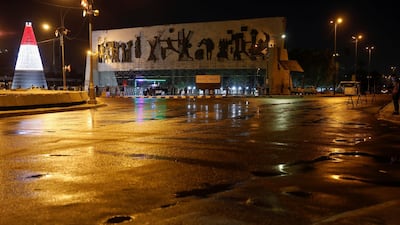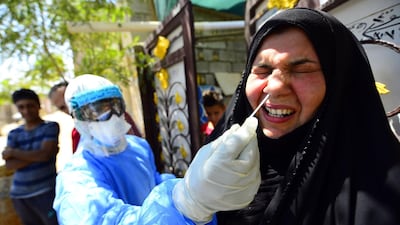More than 50 per cent of new coronavirus cases in Iraq during the past three days are from the UK variant, Health Minister Hassan Al Timimi said on Thursday.
"We have witnessed a rapid outbreak of the new strain during the last three days," Mr Al Timimi said.
Young people and children recorded the highest number of infections, he said, and urged the public to follow government coronavirus guidelines to minimise its impact as the UK variant appears to be significantly more transmissible than many other forms of Covid-19.
“The increasing number of critical cases across the country puts great danger and pressure on health institutions,” he said.
Iraq is one of the hardest-hit countries in the Middle East, with more than 657,000 reported cases and more than 13,000 deaths since the outbreak began.
Health authorities reported 3,896 new cases on Thursday and 16 deaths.
Although the numbers have dropped dramatically in recent weeks, Mr Al Timimi said they could rise again.
The public must avoid “movements between cities as well as gatherings” to reduce the number of infections, he said.
The minister said schools and places where people gather – including mosques and beauty salons – will close to limit the spread of the virus.
Britain and South Africa reported fast-spreading variants of the coronavirus, prompting some nations to ban travel to the two countries.
The Iraqi official said a night curfew will come into place on Thursday across the country.
The curfew will be from 8pm to 5am for a period of two weeks.
There is concern that Iraq's health system will not be able to cope with a major surge of Covid-19 after years of war, UN sanctions, neglect and corruption.
In December, the country said it had agreed with Pfizer to import 1.5 million doses of its Covid-19 vaccine.
Pfizer's vaccine must be stored at minus 70°C, a temperature much lower than standard freezers and which forced the company to develop special containers for transport.
Iraq is one of the hottest countries in the world and has a dilapidated power-generation network that results in daily cuts to the mains supply.





























